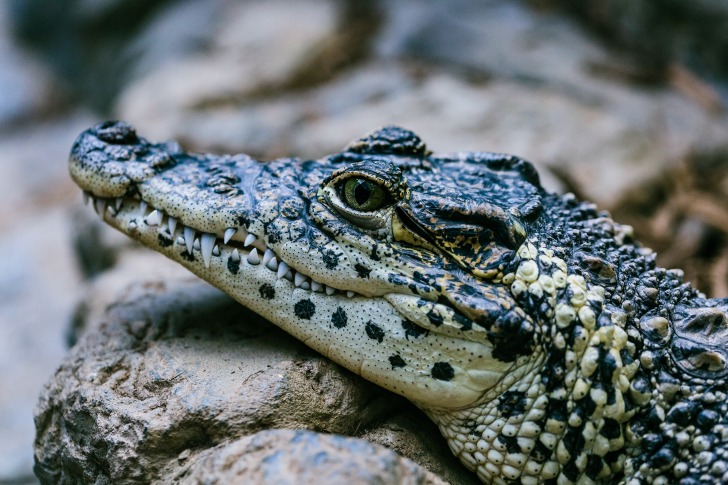When you think of the location of alligators, you aren’t likely to consider the mid-Atlantic states like North Carolina.
Alligators are more of a Florida and deep south predator, right?
Alligators are massive animals with powerful tails used for defense and swimming.
Their nose, ears, and eyes are on top of their head and sit above the water line while floating to search for prey subtly.
If you’ve ever wondered whether these fascinating reptiles are located outside of the deep south in North Carolina, keep reading to learn more!

Contents
- So… Are There Alligators in North Carolina?
- Alligator Species in North Carolina
- Is it Safe to Swim in North Carolina?
- Interesting Facts About Alligators in North Carolina
- Alligators vs. Crocodiles – differences and note if alligators or crocodiles in NC
- 3 Safety Tips for Swimming in Alligator-Infested Waters
- North Carolina Safety Overview
- Frequently Asked Questions
So… Are There Alligators in North Carolina?
Two remaining alligator species still exist in the world, one of which can be found in North Carolina, most in the Outer Banks or the Alligator River National Wildlife Refuge.
The American alligator is located in the state, and the further south you travel, the larger they become.
Male North Carolina alligators can weigh up to 500 pounds and reach 13 feet in length, while females weigh up to 200 pounds and grow to just under 9 feet.
Alligator Species in North Carolina
The only alligator species found in North Carolina is the American alligator, the same one found in the southeastern US.
Within the state, the American alligator is located in the southeastern section that borders the outer banks and South Carolina.
Is it Safe to Swim in North Carolina?
Although alligators have been known to attack humans, this is unlikely and not a typical scenario.
While most believe alligators are aggressive, they are timid creatures that are scared of humans and try to keep to themselves.
Unfortunately, there are plenty of other dangers when swimming in North Carolina, including:
Inclement Weather
Swimming in inclement weather poses a danger.
When lightning or thunderstorms threaten the area, it’s critical to seek cover in an enclosed building or metal vehicle.
Swimming during a hurricane or storm presents unpredictable currents, the chance of being struck by lightning, and a rocky ocean.
Even the best swimmers will struggle with staying above water during a storm.
Jellyfish
Portuguese man of war and jellyfish stings can be excruciating and you must seek medical attention.
Jellyfish are found underwater and have tentacles with a stinging mechanism that hangs below their bodies.
Portuguese man o’ war floats on top of the water with tentacles that stretch underneath.
Both sea creatures inject venom when stinging and can continue to sting after death, so it’s best to exit the water immediately if you see one and don’t touch it when on the beach.
Rip Currents
Rip currents are a significant concern when swimming in North Carolina, especially in areas without lifeguards.
A rip current is a flow of water that moves away from short and can pull unsuspecting humans out to sea.
Since this current flows underwater, it’s impossible to see from the surface.
Indicators of a rip current include choppy water flowing at an acute angle to shore, a difference in water color, lines of foam moving seaward, and a break in the wave pattern.
Although shark attacks are more common than alligator attacks in North Carolina, they are relatively rare.
Most encounters between humans and sharks are due to mistaken identity, whereby the shark thinks the human is a fish or other sea life.
Most attacks occur in the water close to the shoreline, between steep drop-offs and sandbars.
While many tips exist for avoiding sharks if the lifeguard tells everyone to exit the water, get out as fast as possible.
Sun Exposure
The other primary concern when swimming in North Carolina is extensive sun exposure.
You could get severe burns while swimming without proper sunscreen or beach gear.
In addition, since the water will keep you cool, you may not be aware that your skin is baking in the sun.
Prolonged sun exposure can lead to skin cancer, so wearing sunscreen with each dip is critical.
Interesting Facts About Alligators in North Carolina
The American alligator is a fascinating creature with many little-known facts, including:
- All alligators play a critical role in the local ecosystem by eating fruit (and meat) which spreads the seeds throughout the local environment.
- Alligators grow their entire lives, which is why they are so large at their oldest age.
- American alligators utilize lures like branches and sticks on their heads to attract birds searching for nesting items.
- The American alligator has between 74 and 80 teeth at any time. When teeth wear down, they fall out and are replaced so that an alligator can go through over 2,000 teeth in its lifetime.
- They are some of the most vocal creatures in the animal kingdom, with different calls to find mates, threaten competitors, signal distress, and declare territory. They don’t have vocal cords, so they suck air into their lungs and release it as intermittent sounds.
- This alligator type can crawl, run, walk, and swim on land. They have a low walk, which is sprawling, and a high walk that lifts their body off the ground.

Alligators vs. Crocodiles – differences and note if alligators or crocodiles in NC
To most, alligators and crocodiles appear similar.
But, while they share many features, they couldn’t be more different.
The main differences between the American alligator found in North Carolina and crocodiles in other parts of the US and the world include:
Aggression Level
Crocodiles are more aggressive than alligators, so they are more dangerous.
As mentioned, alligators are much timider and more scared of humans.
Alligators are less likely to chase you unless provoked, but that doesn’t mean you should go for a leisurely swim with them.
The same common sense must apply to alligators and crocodiles.
Jawline
The jawline and snout shape are the best way to distinguish the two reptiles.
Alligators have a wider upper jaw, allowing their teeth to be hidden.
Crocodiles feature upper and lower jaws that are the same size, thus exposing their interlocking teeth.
Size
Alligators and crocodiles are gigantic reptiles with male gators growing between 10 and 15 feet long, weighing up to 500 pounds.
Crocodiles are even larger, can grow up to 17 feet long, and weigh up to 2,200 pounds.
Snout Shape
The other simple way to differentiate alligators and crocodiles is by their snout shape.
Alligators have a u-shaped, wide, and rounded snout, while crocodiles have V-shaped, pointed, and long snouts.
This shape difference means alligators exert more strength from their mouths, allowing them to have a stronger bite.
3 Safety Tips for Swimming in Alligator-Infested Waters
If you find yourself swimming in alligator-infested waters or have a few screws loose and choose to throw caution to the wind, there are three primary tips you should follow to remain safe:
- Don’t splash around – in the eyes and mind of an alligator, splashing around means there’s a source of food in or near the water. Technically you could be a source of food, but the alligator is considering the source to be fish, land creatures taking a swim, or birds landing on top of the water.
- Don’t wear jewelry – when wearing jewelry in alligator-infested waters, it will shine and glisten in the sun. Alligators will see this as the shininess reflecting off the scales of a fish and think it’s dinner time.
- Always give the gator an escape route – with most gators being scared of humans, they don’t want to be near you. That means, if you see one swimming, let it pass and give it plenty of space to get away from you. Don’t get near it for that Instagram photo, as the alligator could view your attempt as hostile and want to attack.
North Carolina has American alligator’s marsh areas along the Outer Banks in the state’s southeastern part.
These Gators are much more scared of you than you are of them.
However, that doesn’t mean you should go for a dip or try to be friendly with them like the neighborhood dog.
The bottom line is, don’t swim with or near alligators as they can be dangerous.
They are wild creatures that want to be left alone to hunt non-human prey.
Humans get into trouble by getting too close and putting the alligator in a fight-or-flight situation.
While most will flee the scene, they could snap back and attack you if they feel cornered or trapped.
When going to the beach in North Carolina, there are plenty of other, more realistic issues to be afraid of than alligators.
North Carolina Safety Overview
READ THE FULL REPORT: North Carolina Safety Review
Safety Index:
- OVERALL RISK: MEDIUM
- TRANSPORT & TAXIS RISK: LOW
- PICKPOCKETS RISK: LOW
- NATURAL DISASTERS RISK: HIGH
- MUGGING RISK: MEDIUM
- TERRORISM RISK: LOW
- SCAMS RISK: MEDIUM
- WOMEN TRAVELERS RISK: LOW
Frequently Asked Questions
Can alligators smell blood?
Yes, alligators can smell blood from quite a long distance.
If you have a cut, a monthly cycle, or any fresh blood, it’s best to steer clear of alligators (which you should do anyway).
What time of day are alligators most active?
Since they’re nocturnal, alligators are most active at night between sunset and sunrise.
During mating season, alligators are most territorial and aggressive, so it’s best to plan your evening adventure trying to avoid gators during this period.
How can you tell if an alligator is in the water?
There are several ways to detect if an alligator is in a lake, pond, or river.
First, scour the shoreline to see if the gator hangs out by the water’s edge.
Alligators love to sunbathe on the shores so that you may see them on the side of the sliding marks of water re-entry.
Second, look in weedy and shallow areas, which keep them out of view from potential prey.
Third, listen to hissing, a critical warning from the gator telling you that you’re in his territory.
Even if you don’t see the gator, it sees you and is warning you to leave immediately to avoid confrontation.
When leaving the scene, it’s essential to retreat slowly to safer waters as fast movements could trigger aggression.
Do alligators attack above or underwater?
A common myth exists that alligators will attack humans above water.
The truth is that alligators are excellent swimmers so they will attack from underwater.
Similarly, a shark dips its fin before attacking; an alligator will dip its head below the waterline before attacking any prey type.
So although alligators don’t view humans as part of the food chain, they will attack underwater if provoked.












Alligators may seem like an unlikely predator in North Carolina, but their presence is real and must be taken seriously when swimming or exploring marsh areas.